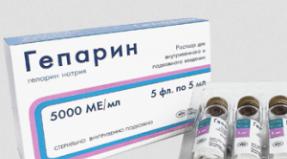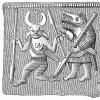Pharmacological substances and drugs - what's the difference? Side effects of drugs
Glucophage is one of the popular medicines for type 2 diabetes and weight loss. On this page you will find instructions for use written in clear language. Find out the indications, contraindications, dosages and side effects. Read the answers to the questions:
- How to take Glucophage correctly.
- How much this drug lowers blood sugar.
- How much excess weight can you lose?
- What to do if blood sugar and / or weight does not decrease.
- How to avoid diarrhea and others side effects.
- How long is the course of treatment.
- What kind of diet should you follow?
- How to combine these tablets with alcohol.
- How the medicine affects the liver and kidneys.
Understand how Glucophage Long differs from conventional tablets. Compare patient reviews about this drug and its inexpensive Russian counterparts.
Instructions for use
| pharmachologic effect | Diabetes medication that lowers fasting and postprandial blood sugar, and glycated hemoglobin HbA1C. Partially blocks the production of glucose in the liver, as well as the absorption of eaten carbohydrates in the intestines. Increases tissue sensitivity to insulin. At the same time, it does not lower sugar excessively, does not cause hypoglycemia in diabetic patients and healthy people unless the recommended dosage is exceeded. |
| Pharmacokinetics | The active substance is excreted from the body by the kidneys in the urine. It is not metabolized in the liver, although it does affect liver function (see below). Does not accumulate in the body, except in people with severe renal impairment. Glucophage Long tablets are absorbed more slowly, but they last longer than the usual Glucophage drug. |
| Indications for use | Patients with type 2 diabetes - in addition to diet and physical activity. Read more. The drugs Glucophage and Glucophage Long, as directed by a doctor, can be combined with other diabetes medications and insulin injections. Many people take them for weight loss, to treat polycystic ovary syndrome in women, and as a cure for old age. |
| Contraindications | Patients who have had diabetic ketoacidosis, coma due to very high sugar in blood. Impaired renal function, glomerular filtration rate (GFR) below 45 ml / min. Liver failure. Fatty hepatosis (fatty liver) is not a contraindication. Acute infectious diseases. Dehydration. Severe heart failure. Alcoholism. Upcoming surgery or X-ray examinations with the introduction of an iodine-containing contrast agent. |
| special instructions | If contraindications are ignored, lactic acidosis can occur. This is a deadly complication in which acid builds up in the blood, its pH drops to 7.25 and below. Symptoms: weakness, nausea, vomiting, shortness of breath, abdominal pain, coma. If there are no contraindications to taking Glucophage medication and you do not exceed the maximum daily dose, then the risk of lactic acidosis is practically zero. |
| Dosage | Maximum daily dose the drug Glucophage - 2550 mg (three tablets of 850 mg each), Glucophage Long - 2000 mg. Reception begins with a minimum dose of 1 tablet of 500 or 850 mg per day. Then it is increased once a week if the patient tolerates the treatment well. Glucophage Long is recommended to be taken once a day at night. Conventional tablets Glucophage - 1-3 times a day, with food. |
| Side effects | Possible diarrhea, nausea, decreased appetite. These are common but not dangerous side effects. They go away on their own after the body gets used to the medicine. To relieve them, start at 500 mg per day with meals and do not rush to increase the dosage. Also possible itchy skin, rash. With long-term treatment, vitamin B12 deficiency in the body may develop. |

| Pregnancy and breastfeeding | Conventional and prolonged-release tablets Glucophage are contraindicated during pregnancy. They don't help with gestational diabetes. Women often take them for PCOS to increase the likelihood of conception. If you did not immediately find out that you were pregnant, and continued to be treated with metformin, it's okay, it's not dangerous. You can study in Russian. Do not take Glucophage during the period breastfeeding, because active substance penetrates into milk. |
| Interaction with other medications | Study and do not take them together with Glucophage. If you inject insulin, be careful not to have hypoglycemia. The following drugs can increase the concentration of metformin in the blood: furosemide and other loop diuretics, nifedipine, amiloride, digoxin, ranitidine, triamterene, vancomycin. This list is not complete, check with your doctor. |
| Overdose | Cases of overdose with an excess of the maximum daily dose of metformin by 40 or more times have been described. An excessive decrease in blood sugar was not observed, but the risk of lactic acidosis was high. Emergency help provided in a hospital. Symptomatic treatment is carried out, as well as dialysis, in order to quickly remove the drug from the body. |
| Release form, storage period, composition | Glucophage - tablets of 500, 850 and 1000 mg. Glucophage Long - tablets of prolonged action of 500 and 750 mg. Keep out of the reach of children at a temperature not exceeding 25 ° C. The shelf life is 3 or 5 years. Active substance - . Excipients - povidone or sodium carmellose, hypromellose 2910, hypromellose 2208, microcrystalline cellulose, magnesium stearate. |
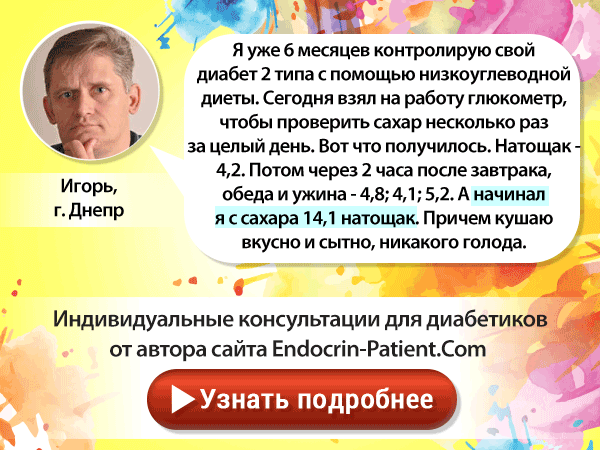
Below are the answers to the questions diabetics often ask about this medicine.
What is the difference between Glucophage and Metformin?
Glucophage is tradename drug, and - its active ingredient. Glucophage is not the only type of pill whose active ingredient is metformin. You can buy this diabetes and weight loss remedy at the pharmacy under many different names. However, Glucophage is an original imported drug. It is not the cheapest, but it is considered to be of the highest quality. This medicine has a very affordable price, even for retirees, so the site does not recommend experimenting with its cheap counterparts.
What is the difference between regular Glucophage and Glucophage Long? Which drug is better?
Glucophage Long is a sustained-release tablet. They begin to act later than regular Glucophage, but their effect lasts longer. This is not to say that one drug is better than another. They are designed for different purposes. The extended-release medicine is usually taken at night so that the next morning there is normal sugar in the blood on an empty stomach. However, this remedy is worse than regular Glucophage, it is suitable for controlling sugar throughout the day. People who experience severe diarrhea with conventional metformin tablets are advised to start taking the lowest dose and not rush to increase it. If this does not help, then you need to switch to the daily intake of Glucophage Long medication.
What are the benefits and harms to the body of Glucophage tablets?
In the instructions for the use of this medication, you need to carefully study the sections on indications, contraindications and side effects. If you have no contraindications, then there will be no harm. For people who are obese, prediabetes, or type 2 diabetes, metformin tablets are of immense benefit. They lower blood sugar, help you lose weight, and improve cholesterol test results and other cardiovascular risk factors. It has been confirmed that this medicine slows down the development of complications of diabetes and prolongs the life of patients.

Millions of people have been taking Glucophage for almost 50 years. Their extensive shared experience has proven that it is a safe drug. The only possible harm is the occurrence of a lack of vitamin B12 in the body. You can periodically take this vitamin in courses for prevention.
Glucophage, Glucophage Long or Siofor: which is better?
Glucophage is the original metformin drug. The term of the patent for it has long expired, so many analogues are sold in pharmacies. - one of them. There are also several analogues made in Russia on the market. assures that Glucophage lowers blood sugar much more strongly than Siofor and other competing metformin tablets. The site's large audience also confirms that Glucophage is better at helping than cheap metformin pills and is less likely to cause diarrhea.
The original drug metformin has a very affordable price. Therefore, it makes little sense to take Siofor and other analogues in order to save money. Glucophage Long - extended-release metformin tablets from the same company that produces the original Glucophage. This drug is best for controlling blood sugar in the morning on an empty stomach when taken in the evening. Also, if Siofor or regular Glucophage causes you intolerable diarrhea, try replacing them with Glucophage Long.
How does this drug affect the liver and kidneys?
Pay attention to the section on contraindications in the instructions for use. Glucophage is contraindicated in liver failure, as well as renal failure at the intermediate and advanced stages. With severe liver and kidney diseases, it is too late to be treated for diabetes ... At the same time, pills can and should be taken by patients with fatty hepatosis (fatty liver). Together with a low-carb diet and physical activity, the drug improves the condition of such people.
Slimming
Glucophage is a popular weight loss product, like others. similar drugs containing. This medicine helps to lose extra pounds not only for diabetics, but also for people who have normal blood sugar. Metformin is almost the only drug that makes it possible to lose weight without harm to health. On the contrary, it will improve the results of tests for cholesterol and triglycerides. Reviews of people taking Glucophage for weight loss confirm its effectiveness. However, excess weight does not start to go away immediately, but after a few weeks. You can expect to lose a few pounds, but metformin tablets are unlikely to help you achieve your ideal weight.
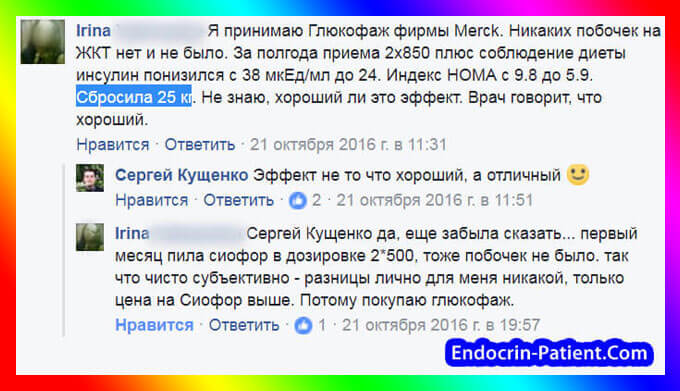 Glucophage and Siofor for weight loss: patient review
Glucophage and Siofor for weight loss: patient review For the treatment of obesity, you need to take Glucophage according to the same schemes as for the control of diabetes. Start with a minimum dose of 500-850 mg per day and gradually increase it to the maximum allowable. You can expect that thanks to this medicine, your body weight will be reduced by 2-3 kg without changes in diet and physical activity. If you are lucky, you will be able to lose 4-8 kg. Glucophage must be taken continuously to maintain the achieved results. If the medication is canceled, some of the dropped kilograms may return back, or even all. The site recommends going to the site so that weight loss is more effective.
Insulin is a hormone that not only affects the absorption of glucose, but also stimulates the deposition of fat, blocks the breakdown of adipose tissue. In people prone to obesity, as a rule, elevated level insulin in the blood. Their tissues have a reduced sensitivity to this hormone. This metabolic disorder is called insulin resistance. The drug Glucophage partially eliminates it, the level of insulin in the blood decreases. This is beneficial for people who are overweight and for those with type 2 diabetes. The closer to normal blood insulin levels, the easier it is to lose weight. A low-carb diet works better for insulin resistance than Glucophage. The optimal result is obtained by simultaneously adhering to a diet and taking metformin tablets.
How to use
Before taking Glucophage for weight loss or against diabetes, carefully read the instructions for use. Make sure you have no contraindications. Check out the possible side effects. Understand the difference between Glucophage Long and regular metformin tablets, which drug is best for your goals. It is advisable to take tests that check the functioning of the liver and kidneys, as well as consult a doctor. However, it is considered such a safe medicine that it is sold in pharmacies without a prescription.
Glucophage often causes diarrhea and other digestive problems. To ease them, if not completely avoid them, start taking with a minimum dose of 500-850 mg per day. Take this medication with food. You can increase the dose by 500 or 850 mg per day once a week or every 10-15 days, provided that the patient tolerates the treatment well. The maximum allowable daily dose is 2000 mg for Glucophage Long and 2550 mg (three 850 mg tablets) for conventional metformin tablets. This is the target dose for treating obesity and controlling type 2 diabetes.
Patients with severe diabetes mellitus can and should combine the intake of Glucophage medication with insulin injections. Metformin reduces the need for insulin by approximately 20-25%, and the transition to - 2-10 times. Diabetics are at increased risk of injecting too much insulin and causing hypoglycemia. Starting to take, it is better to significantly reduce the dosage of insulin, and then gently increase them if necessary. Glucophage is an important, but not essential, part of an effective type 2 diabetes regimen. The main remedy is diet, and pills and insulin only supplement it.
Read about preventing and treating complications:
To slow down aging
Some people take Glucophage to prolong their life. Healthy, thin people hardly need the same high dose for prevention as people with diabetes and obesity. Probably, 500-1700 mg per day will be enough for them. Unfortunately, there is no more precise information on the dosage of metformin as a medication for aging. Research on this issue is still going on, their results are not expected soon. Do not chew Glucophage Long tablets, you must swallow them whole. This drug is less likely to cause diarrhea and other side effects than regular metformin, which is absorbed immediately. Watch Elena Malysheva's video about taking metformin as a medicine for old age.
How long should this medication be taken? Can I drink Glucophage all the time?
Glucophage is not a course drug. If you have indications for its use, and the side effects can be tolerated, then you need to take the pills constantly, every day, without interruption. If the drug is discontinued, diabetes control is likely to worsen, and some of the extra pounds lost will return. Sometimes people with obesity and type 2 diabetes manage to lose a lot of weight, completely change their thinking and metabolism. Only in such rare cases is it possible to stop taking metformin without negative consequences.
Are these pills addictive?
Some time after the patient reaches maximum dose metformin, its blood sugar and body weight cease to decline. They keep stable, and that's okay. The drug Glucophage improves the course of the disease, but is not a panacea and cannot provide complete cure... To successfully control diabetes or prediabetes, you need to not only take pills, but also observe and exercise. In patients who do not lead healthy image life, blood sugar inevitably rises over the years. In such situations, it is convenient to complain that the drug is addictive. In fact, the problem is that you are not following the regime. Eating prohibited foods, as well as a sedentary lifestyle, have a devastating effect on the body. No pills, even the most fashionable and expensive, can compensate for it.
Why should you drink Glucophage Long in the evening?
What kind of diet should you follow while taking this medicine?
It is the only solution for obese, prediabetes and type 2 diabetes patients. Examine and completely eliminate them from your diet. Eat delicious and wholesome, you can use. A low-carb diet is the main treatment for type 2 diabetes. It must be supplemented with the intake of Glucophage medication, and, if necessary, also with insulin injections in low doses. A low-carb diet helps some people lose weight, while others don't. However, this best remedy which we have at our disposal. The results of a low-calorie, fat-free diet are even worse. By switching to a low-carb diet, you will normalize your blood sugar, even if you do not succeed in losing significant weight.
Read more about the products:
Does glucophage raise or lower blood pressure?
For diabetics who are treated according to the methods of the site, blood pressure is rapidly falling to normal. Because that's how it works. It removes excess fluid from the body, eliminates edema and increased stress on blood vessels... Glucophage and drugs for hypertension slightly enhance the action of each other. It is highly likely that you will need to give up all blood pressure medications. It is unlikely that this will upset you ... Refusing to take metformin pills is much more difficult than taking antihypertensive drugs. Don't count on it too much.
Is this drug compatible with alcohol?
Glucophage is compatible with moderate alcohol consumption. Taking this medication does not require a completely sober lifestyle. If there are no contraindications to taking metformin, then you are not prohibited from drinking a little alcohol. Study the article “”, it contains many useful information... You read above that metformin has a dangerous but very rare side effect - lactic acidosis. In normal situations, the likelihood of developing this complication is practically zero. But it rises with strong alcoholic intoxication. Therefore, you should not get drunk while taking metformin. People who are unable to practice in moderation should abstain from alcohol completely.
What if Glucophage does not help? Which medicine is stronger?
If Glucophage does not help to lose at least a few kg of excess weight after 6-8 weeks of admission, take blood tests for hormones thyroid gland, and then consult an endocrinologist. If hypothyroidism (a lack of thyroid hormones) is detected, you need to be treated by taking hormone pills prescribed by your doctor.
In some people with type 2 diabetes, Glucophage does not lower blood sugar at all. This means that the pancreas is completely depleted, the production of its own insulin has stopped, the disease seems to have turned into severe type 1 diabetes. An urgent need to start injecting insulin. It is also known that metformin tablets cannot do anything to help skinny diabetics. Such patients need to immediately, without paying attention to medications.
As a reminder, the goal of diabetes treatment is to keep the sugar constant in the range of 4.0-5.5 mmol / L. In most diabetics, Glucophage lowers sugar, but still not enough to bring it to normal. It is necessary to determine at what time of day the pancreas cannot cope with the load, and then help it with injections of insulin in low doses. Don't be lazy to use insulin in addition to your medication and diet. Otherwise, complications of diabetes will develop, even with sugar levels of 6.0-7.0 and above.
The vast majority of food supplements have various medicinal properties. How to understand their properties and not get confused - our site will help with this. Also, recommendations are given on the use of vitamins and food supplements, advice and recommendations on losing weight with the use of dietary supplements are given, and medical news is presented.
According to experts, people's health by 12% depends on the level of health care, by 18% - on genetic predisposition, and 70% - on the way of life, not the least of which is nutrition.
Medical views, never stable in general, but throughout human history have been unanimous on one thing: the worse the diet, the greater the danger of getting sick. Experts say that the human diet today should contain more than 600 different substances (nutrients). Unfortunately, not everyone can afford a balanced diet for all nutrients.
This is where they come to the rescue biologically active additives (BAA) or nutritional supplements- Concentrates of natural natural substances isolated from food raw materials of animal (including marine), mineral, vegetable origin, or substances obtained by chemical synthesis that are identical to natural analogues. The overwhelming majority of them have various medicinal properties if they enter the body in certain quantities, proportions and combinations. Their main difference from medicines in the fact that dietary supplements (or food additives) help the body to "self-adjust" and eliminate violations leading to the development of a disease. Dietary supplements (food additives) do not work "instead" of the body's regulatory systems, but eliminate the deficiency or excess of substances in the human body. Their use allows you to consistently restore the human body without harming it and without the destructive side effects inherent in many drugs.
Food additives, like medicines, are produced in the form of balms, extracts, tinctures, infusions, creams, dry and liquid concentrates, syrups, tablets, powders, etc., present in the overwhelming majority of the most common products - from yoghurts to sausages ... There are more than 500 of them in the world, ranging from the familiar vinegar to the unpronounceable "tert-butylhydroquinone".
This table will help you understand what is the difference in the direct prescription of dietary supplements and drugs:
In other words, a dietary supplement, unlike a medicine, is not a tool for direct bombardment of the cause of the disease... This is a tool that allows you to accumulate the strength of the body for an independent fight against the causes of the disease. The purpose of using drugs has never been to ensure and maintain good health. Agree, who will consume medications, being in health. While the support of the latter is constantly needed. But what is especially interesting is that this rule does not work in the opposite direction. That is, to stop some undesirable process, and both of them can prevent a catastrophe. Only the principle of operation is different. For drugs - direct, for dietary supplements, as already mentioned - indirect, through the mobilization of the body's forces that can affect the course of the disease.
By the way, one of the directions in the use of dietary supplements is just regulation and normalization of various body functions in diseases... In combination with the main treatment, this helps to shorten the duration of treatment, reduce the dosage of drugs. This approach can be seen in the actions of experienced doctors. They tend to be individual program for each patient, providing for the elimination of allergens and toxins, the normalization of microflora, an increase in the body's nonspecific defense and other measures with the use of dietary supplements. In our next articles, you will learn about what dietary supplements are, what can be included in their composition and how the effectiveness of these drugs depends on the method of their production.
Complications of drug therapy are called differently: side effects of drugs, drug allergies, drug intolerance, drug pathology, etc.
Adverse reactions caused by certain drugs can be summarized as “side effects of the drug” or “complications of pharmacotherapy”.
Groups of side effects of drugs
In the clinical and pharmacological aspect, the side effects of drugs should be divided into several groups.
Allergic reactions negative and delayed types are most often caused by drugs:
- gold - 30-40%;
- penicillin -5-55%;
- anti-tuberculosis drugs - 8-45% and others.
They manifest clinically:
- dermatitis - in 45-50% of cases;
- eosinophilia - 40-45%;
- leukocytosis - 20-30%;
- leukopenia - 15-25%;
- urticaria - 10-20%, etc.
Such clinical phenomena are due to the allergization of the patient's body, as well as the quality of the drugs (manufacturing technology, duration and storage conditions). So, tetracyclines rarely cause allergic reactions, due to improper storage and taking of a drug with a prolonged shelf life, this agent can cause an active allergic reaction(O.P. Viktorov, 2008).
Pharmacotoxic reactions due to an absolute or relative overdose of the drug, manifested by symptoms due to the pharmacodynamic properties of substances (atropine - dry mouth; reserpine - neuroleptic effect in patients with hypertensive disease). Clinically, these are ulcerative lesions of the mucous membrane of the alimentary canal, changes in the number of blood cells, dysfunction of parenchymal organs, etc. Possible manifestations of nonspecific properties of the drug, in particular the effect on the fetus during pregnancy (embryotoxicity, teratogenic effect, fetotoxicity), as well as carcinogenic, mutagenic effects.
Changes in the immunobiological properties of the body(weakening of immune responses - immunosuppression, manifested by superinfection, frequent relapses infectious diseases, dysbiosis, candidiasis, staphylococcal lesions of the skin and other organs). Such complications cause:
- antibiotics,
- sulfonamides,
- immunosuppressants,
- antineoplastic agents.
Frequency of drug side effects
The question of collateral and toxic effect Many large monographs are devoted to drugs both in our country and abroad, many information letters have been written about the complications of drug therapy. These letters are based on reports from hospitals about different types side effects of drugs.
By 1968, the English literature reported the appearance of various negative reactions with drug treatment on average, 15% of people. But by 1972, American authors observed negative reactions with drug therapy in 55% of people.
There is a constant increase in deaths with the administration of penicillin. In France for last years the frequency of deaths with the introduction of penicillin increased 16 times. A natural question arises: were there any negative effects of drugs in the previous periods of the development of medicine?
Already in the days of Hippocrates, it was known that drugs under some circumstances provide the desired therapeutic effect, and under others they cause undesirable effects that worsen human health. In 1881 in Berlin, Levin published the book "Side Effects of Drugs". In the eighties and nineties of the XIX century, doctors began to produce contraindications for the prescription of medications. By the end of the 19th century, doctors had a conviction that it was necessary to select the appropriate drugs in the appropriate dose for a particular person.
Classification of side effects of drugs
To date, there is no exact classification of side effects / adverse reactions of drugs. In 1967, the classification of the undesirable effects of drugs was adopted.
- Overdose:
- absolute,
- relative.
- Intolerance.
- Side effects:
- specific,
- nonspecific.
- Secondary action.
- Idiosyncrasy.
- Allergic reactions.
Tareev A.N. (1968) proposed a scheme of etiological and pathogenetic factors of drug syndrome: toxic, nonspecific, teratogenic and mutagenic. Such a classification of the manifestations of side effects of drugs reveals the genesis of its individual syndromes and thereby determines the appropriate pathogenetic treatment.
According to the mechanisms of the incompatibility of the body with the drug, the following are distinguished:
- drug allergy,
- drug toxicity,
- medication idiosyncrasy.
Toxic effects are the result of high doses of drugs. Idiosyncrasy is a genetically determined reaction of the body. Drug allergy is determined by the immunological factors of the body and the drug.
WHO identifies the following main groups of adverse reactions:
- Allergic, dose-independent drug - type B.
- Toxic, dose-dependent, type A.
- Local - at the injection sites.
- Interaction reactions of drugs - occur when several drugs are used and is a consequence of their mutual influence on the processes of pharmacokinetics and / or pharmacodynamics.
- Reactions versus drugs.
- Teratogenic effects are fetal abnormalities associated with the use of drugs.
- Carcinogenic effects - the formation of tumors associated with the use of drugs.
Causes of side effects of drugs
Side effects of the drug is any adverse reaction due to the pharmacological properties of a medicinal product, which is observed exclusively when used in doses recommended for medical use. Adverse drug reaction is a combination or individual manifestations of the negative properties of a medicinal product that impede its effective and safe use in a patient or cause a negative impact on his quality of life. An adverse reaction is an unintentional and harmful reaction to the body that occurs when the drug is used in therapeutic doses for the purpose of prevention, treatment, diagnosis of a disease, and modification of physiological function. Taking a medicine is always associated with a certain risk.
The reasons for the inevitable risk, according to D. Lawrence, P. Benitt (1991), during pharmacotherapy are as follows:
- Insufficient selectivity of the drug.
- Some drug effects that are desired in one body system may cause unwanted effects in others.
- In the implementation of many physiological functions close analogous mechanisms are involved.
- Prolonged exposure to cellular mechanisms can lead to permanent changes in the structure and function of cells (including carcinogenesis).
- Limited information about pathological processes.
- Patients with genetic diseases can suffer in a very high degree, they may have an unexpected immune response to administration medicinal substance.
- The selection of the required dose is inevitably inaccurate ( diabetes, depression).
- In cases of incompetent and accidental prescription of drugs.
Types of side effects of drugs
Distinguish between explicit or obvious side effects of drugs with a certain clinical characteristics(Hypertension with prolonged use of corticosteroids) and rare and unpredictable (not described in the literature and may not always be associated with the action of the drug).
By clinical course distinguish between:
- lungs- without discontinuing the drug, or special treatment (headache when using nitrates);
- moderate that require discontinuation of the drug and the appointment of treatment (urticaria);
- heavy- with a threat to the life or disability of the patient (anaphylactic shock);
- deadly.
Therefore, the side effects of drugs are divided into serious and non-serious.
Serious side effects of drugs- these are those that pose a threat to life (regardless of the dose), lead to the death of the patient, disability, require additional hospitalization, contribute to fetal anomalies or congenital anomalies resulting from drug overdose. Difference Between Serious and Severe side effects is that serious - provide for significant harm to the patient's health due to the development of the effects that are indicated above, and severe - this is a measure of the manifestation of side effects.
Minor side effects of drugs is defined as any of the adverse reactions that do not meet the criteria for "Serious Adverse Reactions".
The side effects of drugs are predictable and unpredictable.
Alleged Adverse Reactions are described in well-known reference books, manuals, textbooks, monographs, as well as leaflets (instructions for the use of medicines). The development of an expected adverse reaction cannot be a reason for a lawsuit against the doctor.
Unpredictable side reaction(by nature, severity of the course or frequency of occurrence) is not expected, is not described in well-known reference books, manuals, textbooks, monographs, manuals for medical purposes.
A side effect should also be distinguished - a reaction that is not related to a therapeutic goal, harmless or such that it is harmful, the action of the drug in therapeutic doses turns out to be next to the main specific effect (drowsiness when administered with histamine H1 receptor blockers of the first generation).
Side effects of the drug are caused by the tendency to prescribe drugs in high therapeutic concentrations, the appointment of treatment in doses without taking into account the individual characteristics of the patient, his heredity, long-term treatment, children and elderly age patients, as well as polypharmacy.
After establishing the relationship between the desired pharmacological and side effect, it becomes necessary to give a quantitative and qualitative assessment of the benefit / risk ratio, that is, the likelihood that the discovered side effect will worsen the course of the disease and the effectiveness of treatment.
When taking the drug, undesirable "phenomena" may occur - withdrawal syndrome ("rebound"), tolerance to therapy, drug addiction etc. Withdrawal syndrome occurs when the drug is suddenly stopped (withdrawal of clonidine and hypertensive crisis, antianginal drugs - an attack of angina pectoris). Tolerance it is difficult to distinguish therapy from the patient's reduced sensitivity to the drug, and only then can one think about it when the lack of effect from the use of the drug cannot be overcome by increasing the dose or the effect is manifested in a dose that causes undesirable, dangerous effects.
Prolonged repeated, not always regular, administration of drugs that change mental functions (psychostimulants or painkillers, suppressing the central nervous system), can lead to the development of drug dependence, which can be mental (with uncontrollable patient attraction and mental disorders) and physical (with severe dysfunctions internal organs and the development of abstinence).
The importance of placebo in determining the effectiveness and side effects of drugs
To test the therapeutic efficacy of drugs in clinical trials, dummy drugs — placebo — are used. Placebo- this term, legalized by medicine in 1894, denotes a drug that obviously does not possess any healing properties... Initially, these were "pills" from icing sugar or other pleasant to the taste substance. The Latin word is "placebo" and literally translates as "like". The placebo phenomenon is that it performs surprisingly (compared to its nil healing qualities) results.
Large-scale studies carried out in 1986 under the auspices of the Ministry social protection France, showed that after taking a placebo, headaches disappear in 62% of cases, ulcers and gastritis disappear without a trace in 58 out of a hundred patients, every second cures rheumatism ... For this, one thing is necessary - to deceive the patient by saying that he is being given real medicine. Experts believe that the secret of placebo lies in self-hypnosis. But this hypothesis does not explain many of the oddities of the placebo effect, such as its geographical selectivity. Experiments have shown that at different geographic latitudes, the percentage of successful action can differ quite dramatically. This does not fit into any of the explanations and indicates that the placebo phenomenon is still far from being fully understood by specialists.
The placebo is unable to act directly on the conditions for which the drug is prescribed to change. In addition, the term of the placebo effect is called the very phenomenon of non-drug action, not only of the drug, but, for example, radiation (sometimes different "flashing" devices, "laser therapy", etc. are used). Lactose is often used as a placebo. The degree of manifestation of the placebo effect depends on the suggestibility of the person and the external circumstances of the "treatment", for example, the size and bright color of the pill, the degree of trust in the doctor, and the credibility of the clinic.
Placebo is used as a control drug in clinical trials of new drugs, in a procedure for quantifying the effectiveness of drugs. One group of subjects is given a test drug that has been tested in animals, and the other is given a placebo. The effect of using the drug must significantly exceed the placebo effect in order for the drug to be considered effective. Placebo is also used to study the role of self-hypnosis in the action of drugs.
The typical level of positive placebo effect in placebo-controlled clinical trials averages 5-10%, and its severity depends on the type of disease. In most trials, a negative placebo effect (nocebo effect) is also manifested: 1-5% of patients experience some form of discomfort from taking a "pacifier" (allergies, stomach, cardiac manifestations). For some people, unpleasant expectations of a new drug can take the form of severe pharmacophobia or pharmacophilia.
Sometimes doctors deliberately prescribe placebos for patients who are prone to self-hypnosis painful sensations... In this case, it becomes possible to avoid unjustified neuroses typical for people in modern society and numerous drug complications. The beneficial effect of homeopathic remedies is also attributed to the placebo effect.
Many modern medications act integrally, their healing effect also contains a "placebo component". Therefore, bright and large tablets generally work stronger than small and nondescript ones, and drugs from well-known companies (of the same composition and the same bioequivalence) have a greater effect than drugs from “outsiders of the market”.
This therapeutic suggestion does not require any special skills, since the criticality of consciousness (“I don’t believe”) is overcome by binding information, it is suggested to the actual object - a pill or injection without any real effect on the body. The patient is advised that this drug has a certain effect on the body, and, despite the ineffectiveness of the drug, the expected effect is manifested to one degree or another. Physiologically, this is due to the fact that, as a result of suggestion, the patient's brain begins to produce substances corresponding to this action, in particular endorphins, which, in fact, partially replace the action of the drug.
The second factor that ensures the effectiveness of placebo is an increase in the "defenses" of a person. The degree of manifestation of the placebo effect depends on the level of suggestibility of the person and the physiological possibility of the formation of the necessary chemical compounds.
Doctors have a joke, a kind of black humor - there are no absolutely healthy people, there are under-examined people.
On the other hand, we ourselves are quite suspicious and it happens that when we hear about the symptoms of some disease, we immediately diagnose it in ourselves.
An example from the classics - Jerome K. Jerome in his famous work "Three in a boat, not counting the dogs" very colorfully and accurately describes the main character, who, reading a medical reference book, found in himself the symptoms of all diseases, except for childbirth fever 🙂
One way or another, there are practically no people who have never been sick in their life and, accordingly, did not go to doctors and would not buy medicines at a pharmacy.
Well, if there is demand, there will always be supply. The number of drugs is growing every year. However, like the number various diseases, which
our ancestors didn't even hear.
The same disease can be treated in different ways, depending on the thickness of the wallet and personal beliefs.
We do not like to get sick and almost every person running to the pharmacy hopes for a speedy recovery with the help of pills, mixtures, suspensions, ointments and other medicines.
Which medicines to choose - expensive or cheap, and is there a middle ground?
What, apart from the price, is the difference between an expensive and a cheap drug?
A doctor or a pharmacy worker usually answers: different manufacturers, but the active ingredient is the same. Perhaps they say so because of the lack of time for detailed explanations, but agree, who will say after that - let's get expensive?
And in general, why buy expensive?
Need to understand why some drugs are more expensive than others, although the active substance they have is the same?
How to choose medicines?
Three advantages of cheap analogs of expensive drugs:
1. Medicinal properties such are the same as those of the dear ones.
2. The cost for the same properties is much lower.
3. They are not faked (it is not profitable - the skin is not worth the scrubbing)
It would seem, what else is needed?
Ten years ago, our medicine had at its disposal only such medicines, with the simplest formula. But with the development of pharmacology and biochemistry, many drugs, thanks to scientific developments and research, based on the same active ingredient, have been improved in many indications and, accordingly, have become more expensive.
What is the difference between expensive drugs and cheap drugs?
1. Lack of side effects
It is the absence of side effects or their insignificant amount that makes the medicine more expensive.
For example, by taking aspirin, you run the risk of worsening stomach ulcers. It can be replaced with a more gentle, but also more expensive drug.
Therefore, if you do not want, while being treated for one disease, to earn another or to resume some of your old chronic disease, when prescribing medicines for you, tell your doctor about all weaknesses Your health and chronic diseases... Carefully study the instructions when choosing medicines in the pharmacy, pay special attention to contraindications.
2. Time to achieve maximum effect
More expensive drugs have lower rates. In some cases, this plays an important role. For example, if it is an antipyretic, heart, or high blood pressure... In addition, if after drinking the medicine, you do not feel the effect for a long time, it is quite possible that you will take it again, and this may already cause an overdose.
3. Dosing
A drug with the same effect can be taken once or twice a day, or 4 times a day. Of course, for use, the first is more convenient
It is more expensive to manufacture, and therefore more expensive.
4. Purification of the medicinal substance
If a medicine is produced on new equipment, the degree of purification is higher, and accordingly it will be more expensive.
5... Excipients or fillers
Some fillers do not play a big role in the treatment of the disease (color, improved taste, ease of use), and some can affect the pharmacological activity of the active substance (increase or decrease it)
6.Dosage form
Four generations are distinguished in drug technology dosage forms:
Traditional
Traditional controlled release form
Drug delivery systems
Targeted drug systems (cells, tissues, organs)
Third and fourth generation dosage forms are more expensive due to high costs
in research and manufacture.
7. Withdrawal time
The less time it takes to remove the drug from the body, the more expensive it will be.
Of the seven differences, in my opinion, two are really important.
Performance
Purification degree
Unfortunately, it is not possible to choose medicines based on these parameters alone, and new generation medicines have been improved “in combination”.
The difficulty for us, consumers, is that we cannot fully understand all the intricacies of safety, dosage and a wide spectrum of drug action, and in this we have to rely on doctors or pharmacies. The people who prescribe and sell us drugs.
And they, in turn, ask questions to patients - Is the medicine expensive or cheap for you??
A poster in the hospital - "No money - be healthy!" It would seem a joke, but it reflects the entire tragedy of the situation. The lack of health insurance leads to the fact that a sick person, if he does not have enough funds, must himself, without a medical education, decide which medicine to choose - expensive or cheaper analogue.
Mistrust in doctors raises doubts as to whether an expensive medicine is sometimes worth paying 2-3 times more for it. That is why the Ministries of Health of some CIS countries recommend, when prescribing, to prescribe to patients not a specific medicine, but an active substance necessary for the treatment of his disease.
In this case, the choice is yours and when buying medicines, now you need to be more careful, and even better not to get sick 🙂
Patients with various pathologies of the heart and blood vessels in complex therapy prescribe drugs containing magnesium and potassium. Often the question arises as to which is better - Asparkam or Panangin. It is impossible to unequivocally answer this question, because each drug has its own characteristics. To understand how both drugs work on the body, and to try to figure out which one is better, a comparative analysis should be carried out.
What are the similarities of drugs
Panangin and Asparkam are medications used among patients with heart disease. Medicines can improve cardiac activity, maintain the level of trace elements in the body. Both tools have both similarities and differences.
Common drugs:
- both the one and the other medication includes potassium, magnesium. This is what makes it possible to use both means to replenish the level of trace elements in the body;
- both are available over the counter without a prescription;
- analogues have a similar regimen. Usually, patients are prescribed 1 - 2 tablets three times a day;
- Both drugs help prevent the involuntary contraction of a person's muscles that occurs with the constant use of diuretics to lower blood pressure;
- the products have similar indications for use. These include ischemic disease heart failure, heart failure, hypertension, potassium or magnesium deficiency in the body.
The drugs are similar in composition and action. Both funds are necessary for the heart in its severe pathologies. With regard to the therapeutic effect.
Important! Cannot be distinguished best medicine, both of them have approximately the same effect on the body.
The difference between drugs
What is the difference between medications? The main difference between Asparkam and Panangin is the country of manufacture of drugs. Asparkam is a domestic product, Panangin is produced by a Hungarian company. The cost of drugs also differs. Panangin is more expensive, its approximate cost is 140 rubles, the price of Asparkam is from 10 rubles. Domestic medicine is produced in the form of tablets, Hungarian - in the form of capsules. The main advantage of Panangin is a more convenient form of administration. In addition, the capsules are covered with a special protective shell, that is, they do not harm the tooth enamel.
Panangin is produced in the form of film-coated capsules
An important role in the choice is played by the individual preferences of the patient. For some people, it is more convenient to take products in the form of tablets, crushing them into powder, diluting them with water. For such patients, Asparkam is more suitable. Accordingly, patients who find it easier to swallow the capsule should be given preference to Panangin.
For people suffering from gastrointestinal diseases, such as ulcers, gastritis, colitis, the drug is recommended in the form of capsules, since its effect on the walls of the stomach and intestines is more gentle.
Indications for use
Both drugs are indicated for complex treatment cardiovascular pathologies, but there are some differences in indications for use.
Indications for use of Asparkam:
- a decrease in the level of magnesium in the body, which develops under the influence of various disorders;
- dysfunction of the heart;
- potassium deficiency;
- arrhythmia treatment.
Often, Asparkam is prescribed for people who do not tolerate therapy with cardiotonic and antiarrhythmic drugs.
Indications for use of Panangin:
- glitches heart rate triggered by a lack of potassium in the blood;
- dysfunction of the heart muscle due to toxic poisoning, including against the background of taking medications;
- extrasystole of the ventricles;
- transfer of myocardial infarction;
- coronary insufficiency;
- decreased oxygen supply to tissues as a result of cardiac dysfunction;
- potassium deficiency during treatment with diuretics.
It is safe to say that Panangin differs from Asparkam more a wide range actions.
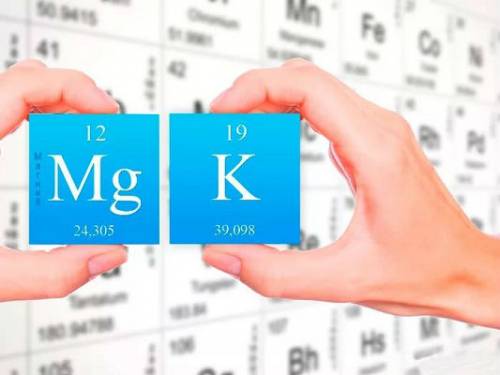
Potassium and magnesium are essential for the normal functioning of the human body
Instructions
The instructions for use of both drugs indicate the same treatment regimen. Both remedies should be taken 1 tablet once a day, it is recommended to do this during a meal or immediately after a meal. The duration of the course is 1 month. After that, you should take a break of 30 days, then repeat the course.
Contraindications
Panangin and its analogue Asparkam are prohibited for the treatment of patients with cardiac pathologies in the following situations:
- development of urinary retention;
- excess potassium, magnesium in human blood;
- severe kidney pathology;
- dehydration;
- increased blood acidity;
- muscular myasthenia gravis.
Despite the fact that both products are sold in pharmacies without a prescription and have natural composition, before using this or that drug, it is recommended to always consult a doctor.
Comparative analysis of the composition
Potassium and magnesium are essential for the normal functioning of all human organs and systems. Pharmacological properties Panangina and Asparkama are provided precisely thanks to these microelements. The table shows the composition of both drugs.
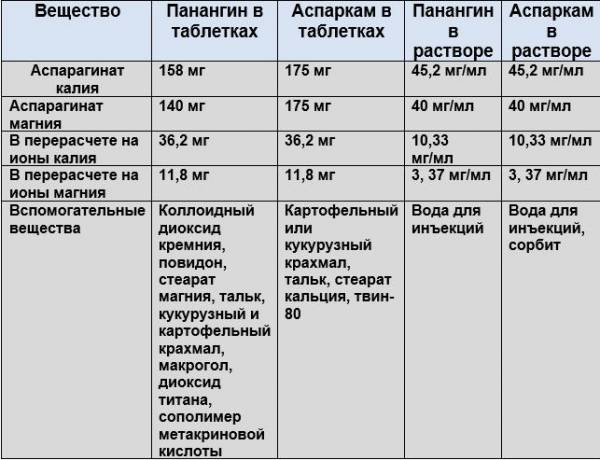
The table shows that the amount of the main active components of both drugs is absolutely identical. The only difference is in the excipients. Additional components do not affect the action of the drug, so it can be concluded that by pharmacological effect the medicines are the same.
Reviews of doctors
What are the doctors' reviews about analog drugs?
Anton Sergeevich, cardiologist, Moscow
“It is impossible to unequivocally answer the question of which is better - Panangin or Asparkam. The drugs have exactly the same composition, so their effect on the body does not differ. Asparkam is a more budgetary option, but it is not inferior to foreign funds. Among the downsides of Asparkam is its tendency to cause hyperglycemia. "
Valery Stanislavovich, cardiologist, Ufa
“I don’t see any fundamental difference between these two remedies, so it’s hard to choose one best medicine. Panangin is available in capsules, I think this is its advantage. In addition, the use of the product is allowed in pediatric practice... The advantages of Asparkam would be the low cost and availability. Both drugs have a number of contraindications, so I do not recommend using them on my own. "
Which is better
Which remedy is still better? Most experts believe that Panangin deserves more confidence, but this opinion has not been confirmed by clinical trials, that is, the best effectiveness of Panangin has not been proven in practice. Both the one and the other drug are good in their action, both funds have an identical composition.
The advantages of a foreign medicine include a sparing effect on gastrointestinal tract... This was achieved thanks to the special coating of the capsules. That is why doctors prescribe Panangin for patients with ulcerative colitis, gastritis, and other diseases of the stomach and intestines.
Why do most experts prefer Panangin? The point is the credibility of the Hungarian campaign and the quality checks used in the country. But according to many patients who tried Panangin treatment, they did not wait for the effect.

When choosing a remedy, you should be guided by personal preferences and doctor's recommendations


